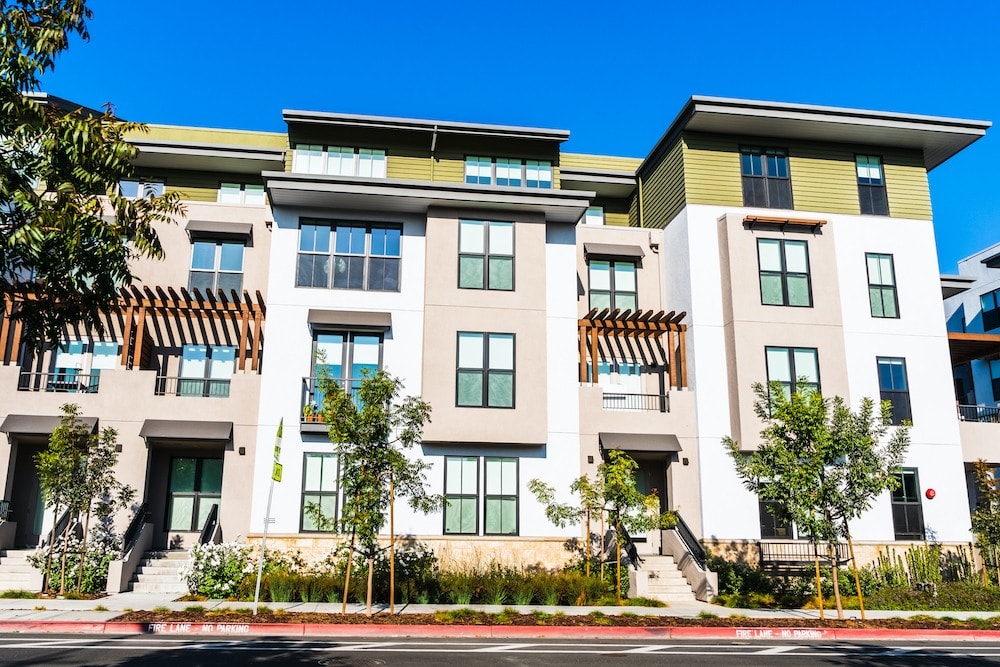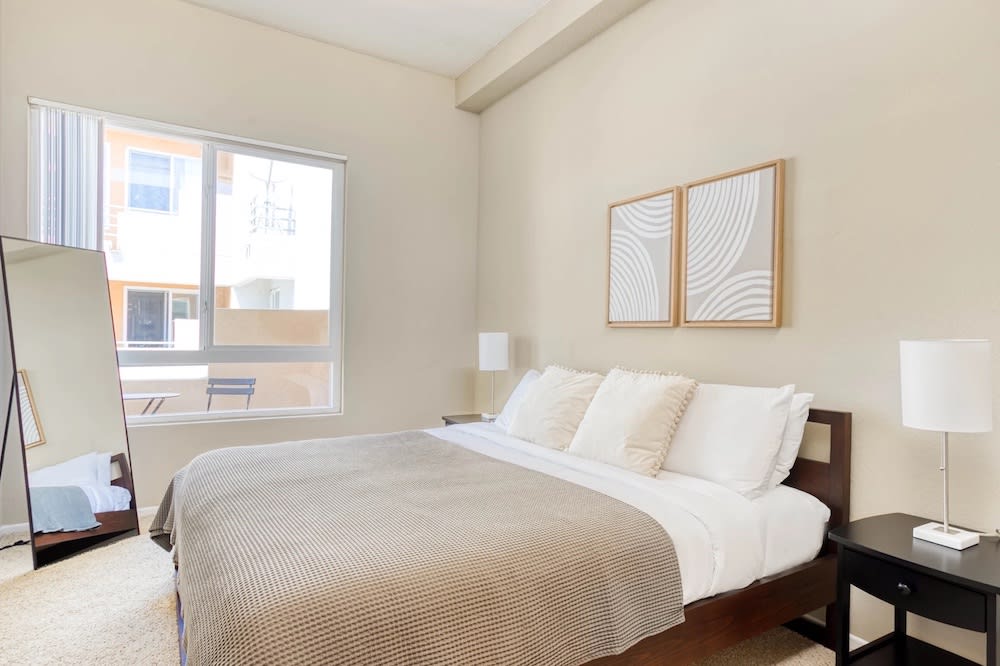Condo vs apartment: Which is best for you?
When it comes to renting a condo or an apartment, it’s important to know the difference! Each type of housing has its own advantages.

When it’s time to move you may be considering all kinds of different living arrangements. If you’re planning to live in a city you may also be wondering about the pros and cons of a condo vs an apartment.
Although condos and apartments have a lot in common, there are some critical differences that can make or break your living situation. Depending on the details, that is!
If you are looking to relocate – whether within your city or across the world – you need to do your research.
In addition to scoping out neighborhoods and considering amenities, you have to decide what kind of housing you’re seeking.
But it’s not easy to decide between a condo and an apartment!
Here’s our complete guide to renting a condo vs an apartment, including the differences between an apartment and a condo. We’ll also cover some of the pros and cons of condos and apartments. This will help you choose the best housing situation for your individual needs.
Read on for everything you ever wanted to know about living in a condo vs an apartment.
What is the difference between an apartment and a condo?
Although apartments and condos have a lot in common, there are some key distinctions that are worth knowing. Whether you choose a condo or an apartment will depend on one or more of these three factors.
Amenities
Generally speaking, apartments and condos have similar amenities. If you live in a large apartment or condo building you can enjoy some bonus extras!
Common amenities for both apartments and condos include in-building or in-unit laundry, coworking spaces, and gyms.
Some buildings also have lounges, pools, terraces, and rooftop gardens for residents.
Many apartment and condo buildings also have parking garages, pet and picnic areas, playgrounds, or tennis courts. The specific amenities will vary depending on building and neighborhood, but you shouldn’t expect a big difference in amenities for condos vs apartments.
It’s important to remember that these amenities usually have rules around them!
Whether you rent an apartment or a condo, make sure you know about all of the regulations in place for using shared amenities. These include coworking spaces, pools, lounges, and other places where you need to respect your neighbors.
Whether you choose an apartment or a condo, be sure to review your lease to see if there are rules around the use of shared amenities. For all you know, one of these rules will be a deal breaker for you.

Leasing terms
Unlike with amenities, there is a big difference between a condo and an apartment when it comes to leasing. In fact, the primary condo and apartment differences relate to the matter of ownership.
Most apartment buildings are managed by individual landlords or property management companies.
In this case, tenants sign a one- or two-year lease to occupy a certain unit.
However, a condo differs from an apartment in that it is owned by a single individual. When you buy a condo you can either live there yourself or lease it out to a subtenant to gain rental income.
That means that if you are renting a condo vs an apartment, you are most likely actually subletting your unit from its owner.
If you are only looking for a one- or two-year lease, it may not matter a great deal to you whether you are renting an apartment from a management company or subletting a condo from a private tenant.
Cost
If you’re deciding between renting a condo vs an apartment, money may end up being the deciding factor.
In general, condos cost more than apartments.
So, if budget is your number one concern in your housing search it is probably best to focus on apartments for the present.
The rental market for condos vs apartments is much smaller since most people are looking to buy condos rather than rent them.
Of course, if you can afford the down payment, a condo can be a great investment! You will generally pay a monthly mortgage payment in lieu of rent.

Buying a condo allows you to build equity, unlike renting. However, once you own the condo you will have very little flexibility around your living arrangements.
It’s also possible that your condo will lose value in a volatile real estate market. Renting an apartment shields you from this potential risk.
What are the advantages of living in an apartment?
The biggest advantage of an apartment is flexibility. Owning a house or condo ties you to a certain city and neighborhood indefinitely.
Imagine that you own your home and find a job in a new city. You might incur a huge loss of income because you need to sell your home quickly.
For the utmost flexibility, you could also consider a short-term furnished rental apartment. You can come and go as you please, plus you won’t have to provide your own furniture and appliances!

Another big plus of living in an apartment is the cost. Normally, it is more expensive to purchase a condo.
Usually, the expense of owning a condo will be greater than the cost of renting an apartment. Oftentimes, it is also more expensive to sublet a condo vs an apartment, because the cost of utilities and building services is built in.
In addition, condo owners have additional monthly or yearly expenses like homeowners association fees and property taxes. Depending on where you live, homeowners association fees and property taxes can add up to hundreds of dollars each month.
If you rent an apartment, you only have to pay monthly rent and a security deposit.
Renter’s insurance is also easier and cheaper for apartments, compared to condos. The reason for this is simple: a renter is only insuring their belongings, not the physical structure of the unit.
What are the advantages of living in a condo?
The number one reason to live in a condo is to build equity.
If you buy a condominium, you begin to build equity. Even though you are only buying an individual unit within a larger property, it is still an asset. Buying a condo isn’t very different from buying a single-family home.
Equity is computed by subtracting the most up-to-date balance owed on a mortgage from the total value of the property. Building equity is the easiest way to increase your net worth.
Unlike condo owners, most apartment tenants cannot build equity. They pay rent to a management company or landlord, essentially helping those third parties build equity.
If you buy a condo and sell it, you will likely make a modest to hefty profit out of the transaction!
Do you have a reasonable amount set aside for a down payment and a steady source of income? If so, you should be able to arrange financing so that you can buy a condo.
Another advantage of buying a condo is that you can rent it out if you want a passive source of income. While your tenant is paying you rent, you are building equity.
Before you commit to purchasing a condo, do your research. Many condo buildings have a website where potential property owners can find out more details about dues and fees.
You can also find information about other policies like subtenancy and the use of shared spaces like pools and courtyards.

Caveats for condos
There are a few disadvantages to condos vs apartments to consider, however.
First, only condo owners can build equity and gain passive income. If you are renting a condo from its owner you are essentially renting it, just like you would an apartment.
Second, homeowners association dues or fees will cut into your financial gains. Nearly every condo complex has a board or homeowners association that uses a pool of funds to cover upkeep and maintenance.
Condo vs Apartment: How to choose
The choice between renting or buying a condo or an apartment can be tough. So how do you decide?
In the end, the choice will likely come down to your personal finances.
If you are looking to build equity and have the ready cash for a down payment, a condo is a great investment.
Yes, the monthly fees and mortgage payments are annoying, but you will be buying an asset you can leverage in the future. After all, it’s quite likely you could sell your condo at a profit.
If you are simply looking for a great place to live for a year or two, there isn’t a big difference between renting a condo and an apartment. Paying rent isn’t fun, but you won’t have to worry about any additional fees or the stress of physical maintenance.
Whether you choose an apartment or a condo for your next home, we hope this guide was helpful!

But instead of wondering about an apartment vs. condo, the real question you should be asking is if you want to deal with the commitment of a year-long lease.
What if you never had to deal with moving furniture again?
Living in a flexible furnished rental apartment may be the easiest way to make that dream a reality.
Blueground’s turnkey apartments in key cities in Asia, Europe, the Middle East, and North America have everything you need to live well, from appliances and furniture to linens and kitchenware. Find out more about the Blueground experience.







